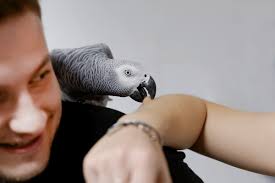African Grey Parrot Biting, African Grey Parrots are renowned for their intelligence, long lifespan, and remarkable ability to mimic human speech. However, despite their popularity as pets, they can sometimes develop behavioral issues — one of the most common being biting. Understanding African Grey Parrot biting is essential for any current or prospective owner to maintain a safe and trusting relationship with their feathered companion.
Why Do African Grey Parrots Bite?
Biting is a form of communication for parrots. When your African Grey Parrot bites, it’s not necessarily out of aggression — often, it’s a reaction to something in their environment or a way to express discomfort or fear. Here are some common reasons behind biting behavior:
1. Fear or Stress
African Greys are sensitive birds that can be easily startled by sudden movements, loud noises, or unfamiliar people. If they feel threatened, biting becomes a defense mechanism.
2. Lack of Socialization
Parrots that haven’t been properly socialized may not understand how to interact appropriately with humans, leading to biting during handling or play.
3. Hormonal Changes
During mating season, hormonal fluctuations can make African Greys more territorial or moody, increasing the chances of biting.
4. Pain or Illness
A normally friendly parrot that starts biting unexpectedly might be in pain. In such cases, a visit to an avian vet is essential.
5. Miscommunication
Sometimes, a parrot may nip or bite to signal they want to be left alone, and if their body language is ignored, it can escalate into harder bites.
How to Manage and Prevent African Grey Parrot Biting
Reducing and eventually eliminating biting behavior requires patience, observation, and consistent positive reinforcement. Here are some proven strategies:
1. Learn Their Body Language
Watch for warning signs like fluffed feathers, pinned eyes, or growling. Understanding these cues can help you back off before a bite occurs.
2. Avoid Punishment
Never yell at, hit, or punish your parrot. This can damage your bond and increase fear-based aggression. Instead, calmly place the bird back in its cage if it bites.
3. Positive Reinforcement Training
Reward calm behavior with treats, praise, or favorite toys. Over time, this teaches your parrot that calm interaction leads to rewards.
4. Offer Mental Stimulation
African Greys are highly intelligent and need mental challenges. Boredom can lead to frustration and biting. Use puzzle toys, foraging opportunities, and regular interaction to keep them engaged.
5. Socialization
Gently expose your parrot to new experiences, people, and environments from a young age. A well-socialized African Grey is less likely to resort to biting.
When to Seek Professional Help
If biting becomes a frequent or severe issue, it may be time to consult a certified avian behaviorist. They can assess the bird’s environment, health, and history to provide a tailored behavior modification plan.
Final Thoughts
While African Grey Parrot biting can be distressing, it is often a solvable issue. With consistent care, empathy, and training, your parrot can become a well-behaved and affectionate companion. Remember, like any intelligent creature, African Greys require understanding and patience — but the bond you build is well worth the effort.
You Might Also Like These:

